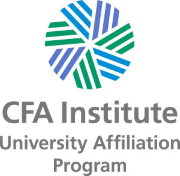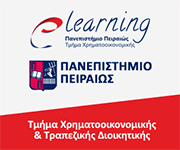Financial Econometrics 1
Course Name: Financial Econometrics 1
Teachers: Antonis Antypas
School: Finance and Statistics
Department: Banking and Financial Management
Level: Undergraduate
Course ID: — Semester: 5th, 7th
Course Type: Field focused, Developing skills
Prerequisites: –
Teaching and Exams Language: Greek
Course Availability to Erasmus Students:
Course webpage: –
Specific Teaching Activities |
Weekly Teaching Hours |
Credit Units |
Weekly Lectures at the Computer Lab |
4 |
Course Content
Quick introductory to Econometrics
Econometric data, econometric model, misspecification testing, hypothesis testing
Case Study: Inferring stock and time selection ability by estimating the market model.
Estimating time varying coefficients
Rolling, Expanding sample techniques
Kalman Filter
Case Study: Risk management and estimating the market model with time varying coefficients
Backtesting Investment Strategies
Introduction to programming an econometric application
Case Study: Momentum vs Contrarian
Binary Models
Dichotomous variables, Probit, Logit
Case Study: Building a model for probability of default
Event studies
What is an event, what is an event study, steps of an event study
Case Study: M&A
Teaching Results
Students attending this course are expected to:
- Understand specific financial applications that are based in econometric tools
- Get familiar with the basic steps required for designing and delivering a financial application
- Have good knowledge of econometric software gretl
- Be able to develop a standalone financial application using gretl’s programming language
Skills
- Retrieve, analyze and synthesize data and information, with the use of necessary technologies
- Make decisions
- Work Autonomously and Team work
Teaching and Learning Methods - Evaluation
Lecture: Presenting theory and at the same time applying theory using a computer
Use of Information and Communication Technologies: Using a computer to run the selected econometric software, using e-class platform for distributing notes and assignments
Teaching Analysis:
Activity |
Semester Workload |
Lectures with personal assignments |
50 |
Power point presentations |
5 |
Study and analysis of scientific papers and book chapters |
95 |
Total |
150 |
Student Evaluation:
Students (in a group or individually) will be assigned a case study that they will be working on during the course. The case study can be on any of the topics presented in the course and students’ success will depend on a presentation of their findings.
Recommended Bibliography
– Recommended Bibliography:
– Related scientific journals:




